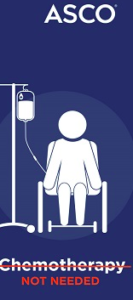 Breaking news in breast cancer research will affect whether or not a significant number of women with early-stage breast cancer can forgo chemotherapy. On June 3rd, at ASCO (the American Society of Clinical Oncology annual meeting) researchers presented their findings of a highly-anticipated study called the TAILORx trial, which followed almost 10,000 women with early-stage breast cancer.
Breaking news in breast cancer research will affect whether or not a significant number of women with early-stage breast cancer can forgo chemotherapy. On June 3rd, at ASCO (the American Society of Clinical Oncology annual meeting) researchers presented their findings of a highly-anticipated study called the TAILORx trial, which followed almost 10,000 women with early-stage breast cancer.
This study is ground-breaking in that it tells us that the biology matters more than tumor size. The behavior of your cancer, and the need for chemotherapy, is better judged by the active genes in the cancer than by the size of the cancer. For many, taking a little pill for endocrine therapy can be much more effective than chemotherapy, without life-threatening side effects. You may not have to lose you hair, after all.
In the study, women ages 18-75 all had estrogen-receptor-positive, HER2-negative cancers that had not spread to the lymph nodes. Their tumors were analyzed using a 21 gene assay to assess the risk of recurrence. This assay (OncotypeDX®) returned a recurrence score (RS) based on how active these 21 genes were in their breast cancer.
Women with recurrence scores (RS) of less than 11 were given endocrine therapy alone, while those who scored over 25 were given chemotherapy followed by endocrine therapy. Those had already both been standard practices. What the new findings reveal is how women over 50 with scores in the middle range, between 11-25, fared equally well whether or not they received chemotherapy.
Typically, women with scores in that middle range would receive chemotherapy. However, in the study, women in that group were randomized to receive endocrine therapy alone while others received chemotherapy followed by endocrine therapy.
Nine years after initial treatments, there was no difference between the two randomized groups regarding disease recurrence, development of a second primary breast cancer, or death.
What this means is that doctors now have clearer guidelines to determine that more early-stage patients can skip chemotherapy. Prior to the study, breast cancer oncologists knew that women with a low score on the genetic test, less than 11, could skip chemo and still beat breast cancer. They also knew that women who scored higher than 26 should have chemo. But there were no definitive findings for women who scored in the middle range, from 11 to 25. Now we have the research and guidelines for that range, which means many more women won’t have to undergo chemo.
The only caveat to these results is that a sub-group analysis of women under age 50 with scores of 16-25 had fewer distant recurrences if they underwent both chemotherapy and endocrine therapy, versus endocrine therapy alone.
It’s amazing how research like this continues to contribute to advances in the treatment of breast cancer, so that more and more patients can experience successful outcomes.
Dr. Aaron Margulies has a solo practice in Breast Surgical Oncology and General Surgery with an office at Tennova Turkey Creek Medical Center in West Knoxville, at Tennova North Knoxville Medical Center in Powell, at Jefferson Memorial Hospital and in Newport. His extensive research and expertise in the most advanced surgical treatments of breast cancer have distinguished him as a leader in the field. To learn more about Dr. Margulies’ compassionate surgical care approach visit www.aaronmd.com or call (865) 692-1610.
